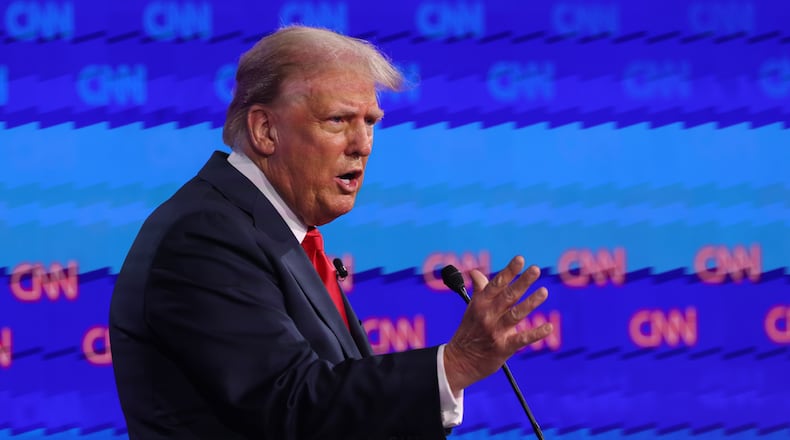The U.S. Supreme Court’s blockbuster decision on Monday that determined former President Donald Trump is partially immune from prosecution is expected to reshape the criminal case against him in Fulton County.
In a 6-3 decision that broke largely along ideological lines, the high court ruled that presidents have “absolute immunity” for their official acts. But Chief Justice John Roberts, who authored the historic ruling, also concluded “there is no immunity for unofficial acts.”
That means Fulton Superior Court Judge Scott McAfee will need to decide which of the 10 remaining felony counts against Trump can pass muster under the high court’s decision. The question: was Trump’s conduct — such as his January 2021 phone call to Georgia Secretary of State Brad Raffensperger — official, and thus must be dropped from the indictment? Or is it unofficial and fair game for prosecutors?
The court said trial judges like McAfee will need to tease that out using “objective analysis of ‘content, form and context.’”
The ruling has “some very deep implications for what (Fulton County District Attorney) Fani Willis is trying to do here,” Georgia State University law professor Anthony Michael Kreis said on The Atlanta Journal-Constitution’s “Politically Georgia” podcast.
A spokeswoman for the Fulton DA’s office declined to comment.
McAfee is unlikely to address the matter anytime soon because the Georgia Court of Appeals recently issued a stay pausing most pretrial work in the case as it considers whether to remove Willis from the prosecution due to an alleged conflict of interest.
‘Potential to really hamstring this case’
Legal experts reached Monday differed in their opinions of what the decision could mean for the Fulton case. Some believed the high court’s conclusion that immune actions stretched to the “outer perimeter” of a president’s official responsibilities meant that Willis could have a hard time keeping much of her racketeering case against Trump intact.
“I think this does hurt the Georgia case quite a lot,” said Atlanta defense attorney Andrew Fleischman, who is closely tracking the case. “There’s not much clear guidance at all. I think Georgia courts will likely also have to apply this novel analysis, and that creates a lot of opportunity for delay.”
Fleischman noted that the decision creates new evidentiary headaches for prosecutors since it bars them from using official acts taken by the commander-in-chief, including speeches as president or discussions with Justice Department officials. Such acts are cited as so-called “overt acts” in the racketeering indictment.
“You’ve got the potential to really hamstring this case,” he said.
John Malcolm, a former federal prosecutor who is vice president of the Heritage Foundation’s Institute for Constitutional Government, said the ruling will make both the federal and Fulton County election subversion cases, “much, much, much more complicated.”
“The court also made it very clear that the thumb is on the scale in terms of concluding that these are official acts, that it’s the prosecution that bears the burden of demonstrating that these are not official acts,” he said.
But others noted that several of the Fulton charges are built upon Trump’s actions as a candidate, which seems to fall under the umbrella of private conduct.
Notably, Trump’s own attorney acknowledged during Supreme Court oral arguments this spring that several allegations against the former president in the Georgia indictment involve actions that were not taken as part of his presidential duties.
Those involve organizing the slate of Republican electors even though Democrat Joe Biden had been declared the winner in Georgia and filing a federal lawsuit filed by Trump in Atlanta that included false claims of voter fraud.
When Justice Amy Coney Barrett in April asked Trump attorney D. John Sauer about both those actions he responded that each sounded private.
Trump’s Atlanta attorneys, however, are expected to argue that the Supreme Court’s decision means that much if not all of the Fulton case against Trump should be stripped away because they were part of his duties as president. Trump attorneys Steve Sadow and Jennifer Little made similar arguments in a January court filing.
Sadow declined to comment on Monday.
Kreis said that based on the Supreme Court’s decision, Trump’s conversations with state officials, including Raffensperger, Gov. Brian Kemp and the late House Speaker David Ralston, would “seemingly fall out of the immunity sphere and therefore would be subject to prosecution.”
The Supreme Court said trial courts will need to suss out whether such communications are considered official or unofficial. Similarly, McAfee will need to determine whether Trump’s attempts to pressure his vice president, Mike Pence, to question the election results from swing states such as Georgia were considered in or out of bounds. A significant part of the Fulton case focuses on the effort to appoint a slate of Trump electors in the event that Pence struck down the official Democratic electors.
Ex-administration officials
It’s possible the ruling could also prompt McAfee to take a fresh look at evidence related to Trump’s interactions with former White House Chief of Staff Mark Meadows and Jeffrey Clark, a Trump loyalist at the Justice Department whom Trump briefly considered appointing as acting Attorney General. Both were charged in Georgia for their actions after the 2020 election.
The Supreme Court ruled that Trump couldn’t be “prosecuted for conduct within his exclusive constitutional authority,” including interacting with members of his executive branch and the Justice Department.
The Center for Renewing America, the conservative think tank where Clark now works, urged Willis to dismiss the charges against him.
“We have vigorously insisted from the very beginning that Mr. Clark is entitled to immunity from prosecution and from bar discipline,” said spokeswoman Rachel Semmel. “The Supreme Court’s decision today confirms that immunity in resounding and unmistakeable terms.”
Emory University law professor Fred Smith said “the mere fact that the president is getting criminal immunity here doesn’t necessarily mean his subordinates get that same immunity.”
“The idea is that the president is in a particularly singular position in terms of the Constitution. And we don’t think that all subordinates or all Cabinet members are equally singular,” Smith said.
Kreis said Fulton prosecutors may ultimately be restricted from using conversations Trump had with Meadows or Clark as evidence against the former president at a trial, but that information could be used separately against Meadows or Clark.
“You may not be able to have Jeff Clark, Mark Meadows and Donald Trump sitting the defendants’ table together at any point because there might be evidence that you can bring against Clark or Meadows that can’t be introduced against Donald Trump,” Kreis said. “So there may be some very complicated issues now that arise in Fulton County.”
What will be tricky for McAfee, according to Smith, will be determining how to apply the guidance from the justices.
“Even though they articulate a test, they don’t actually apply the test to these specific facts. So they’re leaving it to the lower courts to apply the general principle that the court has laid down,” Smith said, adding that the Supreme Court will likely hear challenges to how the test is administered and “tell us whether or not the lower courts got it right.”
The ruling is not expected to impact the prosecution of Trump’s other co-defendants.
AJC producer Natalie Mendenhall and staff writer Michelle Baruchman contributed to this article.
Keep Reading
The Latest
Featured





